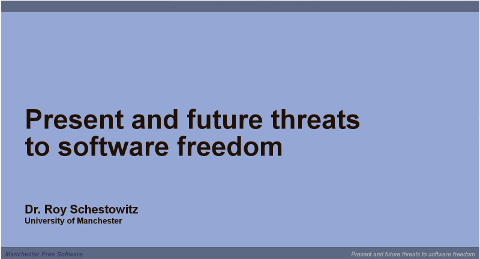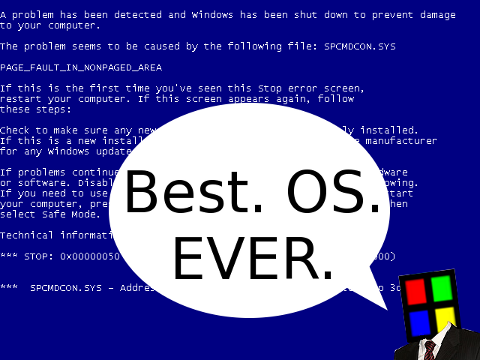07.20.10
Posted in Microsoft, Novell, Virtualisation at 6:44 pm by Dr. Roy Schestowitz

Summary: News from Novell in New Zealand and some general Novell news too
EARLIER on we wrote about New Zealand, which wants to resolve the software patents situation once and for all. Novell is on the side favouring software patents, in general at least. To Novell, patents on software are a big business.
Novell picks up some pieces in New Zealand and attempts to “rebuild [its] local business,” according to this report:
At the time of writing, the vendor had only one staff member locally, based in Wellington, focused on consulting services.
It wants to add a country lead based in Wellington, along with a corporate salesperson there to manage existing accounts. It also wants to recruit a pre and post-sales technical specialist in Auckland.
From the same publication on the same week:
The Novell partner had hoped to be appointed as a third party, or franchisee, to build the vendor’s local brand and sales. However, Novell has decided against this model and is reinvesting in its own business in New Zealand.
Novell does a great deal of proprietary software business. It mustn’t be assumed that SUSE is Novell’s main product. Steven J. Vaughan-Nichols (SJVN) has defended SUSE all these years, even when he wrote for eWEEK that SLED was considered acceptable to him. He continues to defend the Microsoft-taxed SLE* and OpenSUSE, even this month. eWEEK promotes Microsoft software along with SLES, as the summary alone shows:
I kicked off my tests with Hyper-V. Owing to the infamous Linux collaboration arrangement that Novell and Microsoft began back in 2006, I expected the path to running SLES under Hyper-V to be particularly smooth. Right off the bat, I was pleased to find that the so-called enlightened drivers required to use full-speed virtual components under Hyper-V were automatically installed on my test instance.
Why can’t Novell emphasise more of VMware, Xen, and KVM? The first two are somewhat beneficial to Microsoft and Novell chooses to collaborate with these (while mostly ignoring the Red Hat-owned KVM). Novell still has PlateSpin, which was criticised last week:
Nelson used PlateSpin’s PowerConvert tool for physical-to-virtual machine migrations and workload management, and he said he received excellent service and support.
“We could order and activate our licenses without so much as a hiccup, and whenever we called for support, we always got directly to an engineer,” Nelson said. “During one support incident, the engineer conferenced in one of the actual developers because he wanted them to be aware first-hand of the issue we were dealing with.”
After Novell bought them, things changed, he said. Allocating and managing licenses now requires multiple sites, and support involves “a triad of never-ending, nonhuman phone prompts, scripted questions from a nontechnical person, and the feeling of pulling teeth to get to a real, knowledgeable engineer,” Nelson said.
“I miss the old days,” He added.
In other Novell news, it’s all Fog Computing and proprietary software, e.g.:
i. 14 BSM Service Providers to Watch (see this recent post about Novell’s BSM business)
Novell – Novell’s portfolio includes versatile role-aware dashboards, solid correlation and analytics, a CMDB, social networking capabilities, as well as more than 70 fully supported adapters designed to optimized data inputs from other monitoring tools. Novell therefore excels in enabling a unified approach to service management across many diverse investments. It earned a Value Leader position and the Best BSM SI Integration award.
ii. Arrow ECS Receives EMEA Distributor of the Year Award from Novell (press release, also covered here)
iiii. Server OSes need to evolve to stay relevant
He cited the recent announcement made by VMware to partner Novell to complement its existing virtualization software with server OS technology as example of the “growing demand” for options that incorporate both server OS and virtualization platforms.
iv. WEM: Innovation in Customer Experience
“Feature / function innovation has long been the mainstay of technology companies and the primary sort key of competition for many of us,” John Dragoon, Chief Marketing Officer for Novell, wrote as 2009 drew to a close. “And while many technology companies continue to innovate in this area at astounding rates, customers aren’t demanding the type of innovation they can’t consume, use or integrate into their business.
OK, so Novell says that “feature / function innovation” is its strength. Does that incorporate Novell’s obsession with software patents for example (the “innovation” part)? █
Permalink
 Send this to a friend
Send this to a friend
Posted in Free/Libre Software, GNU/Linux, Microsoft at 6:15 pm by Dr. Roy Schestowitz

Summary: Microsoft gradually loses control of the British public sector
AS PROMISED last night, here is a status update about the UK government and Microsoft. With BECTA out of the way, things improve rapidly. First of all, Richard Steel, the "Everything Microsoft" CIO from London, decided to retire early (having been exposed and publicly humiliated [1, 2]) and now comes this similar story from the London Stock Exchange. “London Stock Exchange CTO leaves during move to Linux,” reports IDG.
It is unclear whether Paine’s departure is connected to the change of operating system – Paine was notably instrumental in bringing a major Microsoft-based platform to the LSE. That platform, called TradElect, experienced a number of serious glitches.
In a 2007 interview, Paine said: “We looked at their (Microsoft’s) whole suite of technology from their development environment through to their databases and operating systems, and we decided that their technology was best aligned to achieving this range of design principles”
The TradElect platform was abandoned after the series of outages, one of which lasted all day and led to traders storming out of the building in protest. The LSE is moving to a Linux and Sun Solaris-based Unix platform, which uses an Oracle database.
Last July, the London Stock Exchange indicated that it was moving to the new platform and bought the IT services and software company, MillenniumIT, to help it achieve its aim. Earlier this month, the LSE announced that the rollout of the new system had been delayed by two months for further testing.
We wrote about LSE in [1, 2, 3, 4].
Brian Proffitt, formerly the managing editor of Linux Today, goes further and explores the situation with regards to calls for the UK government to move to GNU/Linux. Microsoft UK has responded to this:
Microsoft UK: Don’t Cave to UK Survey’s Linux ‘Suggestions’
[...]
Well, you know what? Don’t do it. Let the UK government convert to Linux and open source software. Call their bluff, and let them deploy software that is cheaper, faster, and more secure. Don’t cave to those tricky politicians’ sneaky attempts to shake you down. Stand firm on your bottom line, and reap the profit margin you so clearly feel you deserve.
That’ll fix ‘em.
After all, what do you have to lose? You and your bosses in Redmond have repeatedly said Microsoft products are superior to open source applications and operating systems in every way, so you’d teach those government paper-pushers a thing or two when they actually deployed Linux. I mean, you’re not worried that they might find out something different, are you?
As a follow-up, Proffitt writes about the UK National Open Centre:
After taking the opportunity to tease Microsoft’s UK division last week, I found myself wondering, whatever happened to the UK’s National Open Centre?
It was a bit of a circuitous path to get to this question, and a little bit of a winding path to get to the answer.
What started all this was the release of a survey from the Spending Challenge, an austere budget program from Her Majesty’s Treasury. The first-phase results of the survey was public-sector workers asked for ways to save money in the UK budget.
The survey results were a sampling of the nearly 60,000 ideas that were turned into the HM Treasury office… 31 suggestions that were, according to the post, “… not ideas that have been shortlisted for further work or implementation but they will all be considered individually alongside the other 60,000 ideas that have been put forward.”
[...]
Much ado was made about NOC, which held a Feb. 2007 launch event at the Houses of Parliament, where Liberal Democrat MP John Pugh caused a stir with his comments regarding open source’s tenuous status in government.
“Open source has enemies, and its enemies are very, very close to government,” Pugh said at the time.
Here is John Pugh grilling the MSBBC over the Microsoft deal. He did a fine job.
This whole thing just happens to come at a time when Microsoft’s relationship with the NHS is on the rocks and The Register explains why:
Software licensing in the National Health Service is about to get a lot more complicated, and a lot more expensive.
Back in 2004 the Office of Government Commerce signed a massive deal with Microsoft to provide all desktop software within the NHS. This followed some very high-level lobbying from both Bill Gates and Steve Ballmer when it looked like the health service might ditch Microsoft from desktop PCs.
But the NHS enterprise agreement has now been scrapped. A message on the relevant page of the Microsoft website says: “We are currently updating these pages to reflect new licensing information as of May 2010. Please check back shortly.”
“Excellent news: couldn’t come at a better time,” says Glyn Moody regarding this news and adds that “Tavistock and Portman NHS Foundation Trust chooses Koha supported by PTFS Europe”
The library at the Tavistock and Portman NHS Foundation Trust has chosen the Koha open source library management system to replace its existing Unicorn system. PTFS Europe are carrying out the initial implementation and providing ongoing support. The system is hosted at the PTFS Europe data centre in Maidenhead.
Koha Library Management System
With Koha, library staff access to the system is completely web-based; acquisitions, circulation, cataloguing, serials and reports are all done through a web browser. As well as an excellent search engine the OPAC offers a range of Web 2.0 and Library 2.0 facilities such as tagging, commenting and public and private lists. Koha can also integrate with the ArchivalWare digital library as well as other link resolution services.
The Register posted this update regarding the NHS just the following day:
End of Microsoft NHS deal means mass deletions
[...]
Microsoft has warned any NHS worker who took advantage of the huge discounts available for installing MS Office at home that they must now delete the software.
The NHS used to buy its software from Microsoft as part of an Enterprise Agreement. One of the advantages of this purchasing procedure, apart from costing less, was that NHS nurses and doctors or other staff could buy a copy of Microsoft Office to use at home for the not-so-princely sum of £8.95.
[...]
Virtual Desktop Access and Office Roaming must also be switched off.
Great news. Go for it. Before Ballmer packs up his suitcase. █
“Nobody makes any decisions without checking with me first. If you’re going to change any of the interfaces or anything for that matter, you have to talk to me in order to get them approved. We’ll improve communications this way.”
–Steve Ballmer
Permalink
 Send this to a friend
Send this to a friend
Posted in Free/Libre Software, Microsoft at 5:51 pm by Dr. Roy Schestowitz

Summary: Microsoft’s CodePlex Foundation calls software freedom not capitalist
MICROSOFT is up to old tunes and propaganda, courtesy of the new hire which has a history at Microsoft. Stephen Walli again makes it known that software freedom to him is not capitalist. The Source has already responded to this propaganda:
Now, I’m not opposed to companies trying to get their spin out there, but that doesn’t mean I pretend that it’s anything other than what it is: PR spin with only the most tenuous connection to “truth”.
For example, when Novell spreads around that good old-fashioned “IP peace of mind” FUD in ad campaign after ad campaign, I understand it’s “just business” for Novell (and Microsoft). Being understandable doesn’t make something acceptable, though. I understand why SirsiDynix feels the need to lie about Open Source, doesn’t mean I accept it.
Another post comments on a Venn (ish) diagram and says:
But I thought Free Software == Communism?
Yes, to Microsoft it is. Microsoft is hypocritical and dishonest. While the OSI tries to bridge the gap between Open Source and software Freedom, Microsoft/CodePlex does the exact opposite in order to marginalise freedom. █
Permalink
 Send this to a friend
Send this to a friend
Posted in Free/Libre Software, Patents at 5:33 pm by Dr. Roy Schestowitz

Summary: The Intellectual Property Office of New Zealand (IPONZ) is still supporting a back door to software patents, despite premature celebrations that software patents were rendered dead in New Zealand
ACCORDING to some renowned economists, software patents would not be of value to a country like New Zealand, where software patents have been entered through the back door. There is this update on the NZOSS mailing list and the president of the FFII says that “it looks likely that the IPONZ guidelines will define embedded software and allow for embedded software to be patented”
Later he points out that an “NZ Minister [argues] inventions involving “embedded” computer programs should be able patentable“:
Commerce Minister Simon Power has instructed the Intellectual Property Office of New Zealand (IPONZ) to develop guidelines to allow inventions that contain embedded software to be patented.
“IPONZ will formulate draft guidelines and seek the views of interested parties,” Mr Power says.
The process will begin once the Patents Bill has passed its final stages in Parliament.
NZCS seems to be missing the EU-style trick as it goes with the headline “It’s official: Software will be unpatentable in NZ”
Despite what appears to be a big-budget lobbying effort by the pro-patent fraternity, Hon Simon Power announced today that he wouldn’t be modifying the proposed Patents Bill hence software will be unpatentable once the Bill passes into law.
This is significant. As we’ve previously pointed out software patents aren’t black and white, and there are certainly pros and cons. However on balance, we believe they represent a far greater risk to smaller NZ-based software providers than opportunity, and there are many cases where they have significantly stifled innovation.
Tectonic says that “South Africa must take lead from NZ on software patents,” but what really was achieved over there? It’s not as bad as it could possibly be, but it seems like software patenting loopholes may remain. This won’t be the last time we heard from New Zealand about this subject. █
Permalink
 Send this to a friend
Send this to a friend
Posted in Site News at 5:07 pm by Dr. Roy Schestowitz

Summary: Slides from the talk given today
Thanks to those who attended the talk earlier tonight. For anyone who is interested, here are the slides of the talk which lasted about 2 hours. There was also video footage taken, but the quality may be too low. We’ll find out soon. █
Permalink
 Send this to a friend
Send this to a friend
Posted in GNU/Linux, IBM, Microsoft, Novell, SCO, UNIX at 4:57 pm by Dr. Roy Schestowitz

Summary: SCO plans to appeal again; Kevin McBride, the brother of SCO’s disgraced (and fired) CEO from Novell, is saying that “Linux DOES violate UNIX copyrights” and shortly afterwards he throws some code out there, then suppresses further discussion
According to some community sites, news sites like IDG’s [1, 2], and also some blogs, SCO still wants to appeal the decision which says it owns none of UNIX. Even ABC covered it (via AP):
A Utah company is appealing a verdict in a court battle with Waltham-based Novell over ownership of Unix computer server operating systems. A jury ruled that Novell owns copyrights to Unix, even though it sold licensing rights for the technology in 1995 to The SCO Group of Lindon, Utah.
From the Microsoft-sympathetic Motley Fool:
And even when there is a contract available, legalese is far from plain English — Novell (Nasdaq: NOVL) and the big blue IBM (NYSE: IBM) machine have been fighting contract claims from SCO Group for more than seven years, over a document that was already eight years old when they started.
Despite IBM showing that SCO’s claims are bunk, SCO is still at it and it has gotten a new sidekick: Kevin McBride.
It has already been told by the press that after 7 long years of having nothing but allegations without proof, Darl McBride’s brother is forced to back up allegations that he made against Linux in a very embarrassing circumstance (speaking out against the practices used by his brother). Barbara produced a quick summary explaining what had happened:
In a blog post dated July 10th, 2010, Kevin McBride has leaked almost 50 of the code comparisons that were submitted in evidence in SCO vs Novell. You can download the archive.
Read on to view individual files if you don’t want to download the whole thing.
Yes, this is the same Kevin McBride who says:
Software should not be “free.” In this new day and age of corporate control of the world, IP rights are an important barrier of protection that help the little guy. Big companies mostly don’t need IP rights, because they can get their way through force and market power. Small companies and individual developers need strong IP rights so the fruits of their labor are not commoditized by big companies. …
I greatly respect Prof. Stallman and his efforts to create a clean GNU tool chain. Prof. Stallman seems to be an IP purist, who may not believe in copyrights, but would never think of bending the rules. (I’m not sure this is the case, but it is my perception of him.) …
Whether you like it or not, the SCO cases have imposed a level of IP discipline on the open source software world that did not exist before SCO.
Watch the original from Darl McBride’s brother. He ended the discussion and closed the comments after getting “OWNED”, as the saying goes. Alas, by closing the discussion he could not suppress speech; he only relocated speech to an external platform he could not control. He just doesn’t understand how the Internet works, does he?
Some people reserve judgment, Slashdot is where most of the discussion takes place, and discussion about IBM’s side takes place in Groklaw.
Back in 2006, IBM filed a document in the SCO v. IBM litigation that includes five reasons IBM told the court it has what it called “a complete defense” to any SCO claim of copyright infringement, even if SCO had any UNIX copyrights, which a jury in Utah has just ruled it doesn’t.
It talks about ELF, Streams, all the oldies and goodies, the claims that survived Magistrate Judge Brooke Wells’s order granting IBM’s motion to limit SCO’s claims as a sanction. Most of SCO’s list of allegedly infringed materials, filed by SCO under seal, was tossed for lack of specificity. It wasn’t a long list, in any case, as you will see, judging from IBM’s math.
“Even as SCO dies, the company lies,” alleges SJVN:
In the latest revival of SCO’s long disproved claims that there’s Unix in Linux, Kevin McBride, brother to SCO’s ex-CEO’s Darl McBride, claims in the comments to a post about the Lanham Act at his law firm’s Website that, “after careful review of all these issues, … Linux DOES violate UNIX copyrights, particularly in ELF code and related tools (debugger code, etc.), header file code wherein implementation code (not just the header interface) have been copied verbatim; STREAMS code; etc. that the Linux community use without license. Then there is the entire question of the overall structure and sequence of Linux being almost an exact copy of UNIX.”
McBride goes on to write, “There was MUCH more submitted in the SCO v. IBM case that I cannot disclose publicly because it is comparison of code produced by IBM under court protective order that prohibits disclosure.” Oh no! Not the old SCO, “We do have evidence but we can’t show it to you!” line.
Shame on SCO and shame on Darl McBride’s brother, who foolishly stained his firm’s name by associating it with SCO’s case. █
Permalink
 Send this to a friend
Send this to a friend
Posted in Deception, FUD, GNU/Linux, Google, Microsoft at 11:57 am by Dr. Roy Schestowitz
“In an unusual move, Edstrom’s minions had New York’s Empire State Building lit in the Windows 95 colors. [...] Waggener Edstrom claimed that Microsoft received more media attention than even the O.J. Simpson trial, which was going on at the same time.”
–Barbarians Led by Bill Gates, a book composed
by the daughter of Microsoft’s PR mogul Pam Edstrom

Summary: Microsoft’s management is diverting behavioural criticism to Google; Microsoft’s former TE (AstroTurfer) Michael Gartenberg is still whitewashing the company’s image in Engadget
A reversal of truth is something Microsoft is very skilled at doing. One example is counterfeiting (Microsoft enjoys it) and another is the calling of GNU/Linux diversity “communism”. This type of hypocrisy can only ever withstand scrutiny given persistent hypnosis, or simply PR, to use terms that are more commonly used. Microsoft has lots of that.
Who can ever forget how Microsoft corrupted ISO, to use just one recent example of criminal ‘orgies’ at Microsoft (lasting many months and taking place all over the world)? Regarding the latest observations from IBM, The H writes:
At the beginning of July, the International Standardisation Organisation’s (ISO) Joint Technical Committee for standardisation issues in information technology (JTC001) published changes to its procedural guidelines. The new approach can be viewed as a reaction to the large volume of criticism after the expedited adoption of the Office Open XML (OOXML) document standard, which serves as the default format in Microsoft Office 2007. In particular, critics charge that complaints voiced during the expedited proceedings in 2008 were not sufficiently taken into account.
This is an issue which we last mentioned here. The post was titled “Lessons Not Learned From Microsoft’s OOXML Scam” although The H uses the headline “Lessons learned from a hasty standard”. It’s important not to give Microsoft a break just because time has passed. There is more to ISO (and its process) than this one aspect of it. And MPEG-LA is another infamous example of ISO’s incompetence, which is currently being put down by Google’s WebM.
“Microsoft COO Paints Google as Evil Empire,” says The VAR Guy, who observed an unusual public appearance last week. There are many more takeaways from that talk, one of which we wrote about earlier. Kevin Turner is a troublemaker we wrote a lot about in the context of GNU/Linux. Another one that used to work for Ballmer is Michael Gartenberg, who is constantly whitewashing Microsoft, ridiculing its competition, and relying on the fact that few people are aware of his relationship with Microsoft. We wrote about him in posts such as [1, 2, 3, 4, 5, 6, 7, 8, 9, 10, 11, 12, 13]. At the very least he should publicly disclose that he used to work for Microsoft, about which he wrote last week: “Time for Microsoft to once again embrace and extend”
“Microsoft is not disrespected because it’s “successful” (or envied); Microsoft is disrespected, distrusted and also fined heavily because it’s corrupt.”Gartenberg gets across the false message that Microsoft is a great company with bad management. It’s shocking that Engadget still gives him a platform from which to spout out such nonsense as he still pretends to be unbiased while claiming success for Microsoft, no matter how big the failure. He was a big booster of products like Zune too and we covered all that before.
Microsoft is not disrespected because it’s “successful” (or envied); Microsoft is disrespected, distrusted and also fined heavily because it’s corrupt. So who would genuinely befriend or defend such an entity? █
Permalink
 Send this to a friend
Send this to a friend
Posted in Microsoft, Vista 7, Windows at 7:13 am by Dr. Roy Schestowitz

Summary: “Dead OS walking” is indication that people refuse to use new Windows, they are just using what’s already stuck inside their PC (not chosen)
Windows XP was released when I was a teenager, but since Microsoft cannot make Windows any better (Vista 7 does not cut it for businesses), all that Microsoft puts its dumping effort in is XP.
“Microsoft extends Windows XP downgrade rights until 2020,” says IDG.
With 74% of business PCs running XP, the move is more proof that it’s the OS that won’t die
Just a day before Microsoft drops support for Windows XP Service Pack 2 (SP2), the company announced on Monday that people running some versions of Windows 7 can “downgrade” to the aged operating system for up to 10 years.
The move is highly unusual. In the past, Microsoft has terminated downgrade rights — which let customers replace a newer version of Windows with an older edition without paying for two copies — within months of introducing a new OS.
Pogson shows that Microsoft is trying to sell computers like Apple does (selling hardware, not software) and even Microsoft boosters are unable to counter. The fact that XP is still around is a bad sign for the Windows franchise [1, 2]. Steven J. Vaughan-Nichols goes with the headline “XP lives! Windows 7 dies?”
Okay, color me surprised. The last thing I expected from Microsoft was for the company to extend Windows XP’s life for an unbelievable ten years. I thought Microsoft might extend XP Home’s life for a while to try to keep Linux-powered netbooks at bay, especially those with Google’s forthcoming Chrome operating system under the hood — but the business XP line? Until 2020!? I never saw that coming.
I’d thought Microsoft was selling a lot of copies of Windows 7. That’s certainly what Microsoft has been saying. Last January, Microsoft CEO and chief cheerleader Steve Ballmer claimed, “U.S. retail data shows that Windows PC sales jumped almost 50% the week it launched. On Black Friday, [NPD] reported that retailers sold 33% more Windows PCs than the year before. And for the 2009 holiday season a 50% increase in Windows PC sales from last year. Last year was a tough year, but these are still phenomenal numbers.”
Microsoft has pulled the plug on Windows XP SP2, but IDG offers advice to those who still run it. Had people done the same thing with GNU/Linux, then pre-releases of Firefox 1.0 would still be used (or maybe just the Mozilla browser) on top of Linux 2.4. Microsoft managed to make Windows worse in many ways over the years. █
“Booming Steve Ballmer, Gates’s number two, said the company had received an outpouring of mail from customers, much of it saying that the company was too arrogant.”
–Barbarians Led by Bill Gates, a book composed
by the daughter of Microsoft’s PR mogul
Permalink
 Send this to a friend
Send this to a friend
« Previous entries Next Page » Next Page »

























 Content is available under CC-BY-SA
Content is available under CC-BY-SA